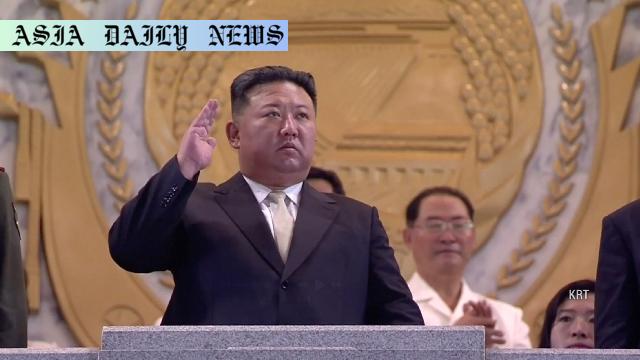North Korea condemns Rubio’s ‘rogue state’ remark as a provocation, reinforcing US hostility and Pyongyang’s nuclear resolve.

North Korea Reacts Strongly to Rubio’s ‘Rogue State’ Comment
In a fiery response to US Secretary of State Marco Rubio’s recent remarks, North Korea’s foreign ministry issued a strongly-worded statement, calling the comment a “political provocation.” Rubio referred to North Korea and Iran as ‘rogue states’ in a media interview on January 30, reaffirming a long-standing US stance. This marks the first instance where North Korea has publicly named and condemned a figure from President Donald Trump’s administration.
A spokesperson for North Korea’s foreign ministry, via a statement released to its state-run media, criticized Rubio’s characterization as perpetuating the “hostile US policy” against their nation. The statement emphasized Pyongyang’s refusal to tolerate any perceived provocations and promised decisive counteractions against such rhetoric.
Pyongyang’s Nuclear and Missile Program Justification
North Korea also took the opportunity to reinforce its commitment to expanding its nuclear and missile programs. Its Institute for Disarmament and Peace, an organization affiliated with the foreign ministry, issued a statement reiterating the need for self-defense capabilities. The institute argued that an increasingly hostile global security climate necessitates the continued development of nuclear deterrence.
North Korea accused the US of escalating tensions by prioritizing the reinforcement of its missile defense systems, interpreting these moves as deliberate provocations aimed at undermining Pyongyang’s sovereignty and security. The nation’s assertion of its right to self-defense comes amid heightened concerns over its missile tests and nuclear ambitions typically criticized by the international community.
The Role of US Policy in Shaping North Korea’s Strategy
North Korea’s reaction highlights the enduring tensions between itself and the United States. Past US administrations have adopted a mix of sanctions, threats, and negotiations in grappling with Pyongyang’s nuclear program. However, the Trump administration’s rhetoric and policies, including the reinforcement of missile defense systems, appear to have solidified North Korea’s resolve to maintain and enhance its self-defense strategy.
Pyongyang sees inflammatory language, such as labeling it a ‘rogue state,’ as serving to justify perceived American aggression in the region. By calling out specific members of Trump’s team, including Rubio, North Korea seeks to underscore what it calls a systematic violation of its sovereignty and rights.
Global Implications of North Korea’s Warning
The broader implications of North Korea’s statements are significant. With the international community pressing for denuclearization and regional stability in East Asia, Pyongyang’s insistence on nuclear development poses a diplomatic and security challenge. The continued clash between North Korea and the US over rhetorical attacks and defense strategies risks exacerbating geopolitical tensions.
North Korea’s comments also serve as a reminder of its defiance against the global consensus aiming to curb weapons proliferation. Pyongyang justifies these measures as necessary for its survival amidst a hostile environment, dominated by US policies. The focus now shifts toward the international response to Pyongyang’s statements and the future course of US-North Korea relations under Trump’s administration.
Looking Ahead: Possible Scenarios
It remains to be seen whether this verbal exchange between North Korea and the Trump administration will lead to meaningful diplomatic negotiations or further escalate tensions. Given North Korea’s history of leveraging its nuclear program for domestic legitimacy and international bargaining power, the challenges facing US foreign policy are considerable.
The global community must address these challenges with a mix of diplomacy, pressure, and engagement to ensure that regional stability is not compromised. Whether an effective balance can be struck will largely hinge on whether both nations can avoid entrenching themselves further into antagonistic positions.
Commentary
A Familiar Pattern of Verbal Sparring
North Korea’s sharp reproach to Marco Rubio’s ‘rogue state’ comment underscores the longstanding narrative of hostility between Pyongyang and Washington. It is almost routine to witness rhetoric exchanged between the two nations. However, this particular episode stands out as Pyongyang has chosen to single out a prominent individual from Trump’s administration—an administration already perceived to take a more hawkish stance toward the country.
The Nuclear Debate: National Security or Global Threat?
At the heart of this exchange lies North Korea’s continued dedication to its nuclear ambitions. Pyongyang frames its nuclear development as a critical element of its self-defense strategy, using the prevailing US rhetoric as justification. However, this defense is immediately counterbalanced by global concerns over nuclear proliferation and the risks of miscalculation in such a volatile region.
The challenge remains in balancing North Korea’s perceived security needs with the stability of the broader international order. The choice of rhetoric—whether it is inflammatory or diplomatic—plays a pivotal role in shaping these dynamics.
Where Do We Go from Here?
The ongoing friction between the US and North Korea requires careful management to avoid further escalation. Mutual understanding, though difficult under current circumstances, represents the first step toward addressing the underlying issues. Both nations must tone down aggressive posturing to avoid plunging the region into unnecessary conflict. Rubio’s remarks, despite their harsh tone, reflect a need for vigilance. At the same time, North Korea’s reaction points to an underlying suspicion of US intentions—a suspicion that perpetuates this repetitive cycle of hostility.
As a global audience watches this unfolding narrative, it is clear that the stakes are too high for missteps. Both the US and North Korea must demonstrate responsibility and restraint in navigating this delicate geopolitical landscape.


